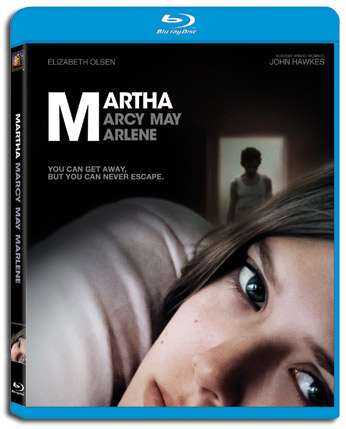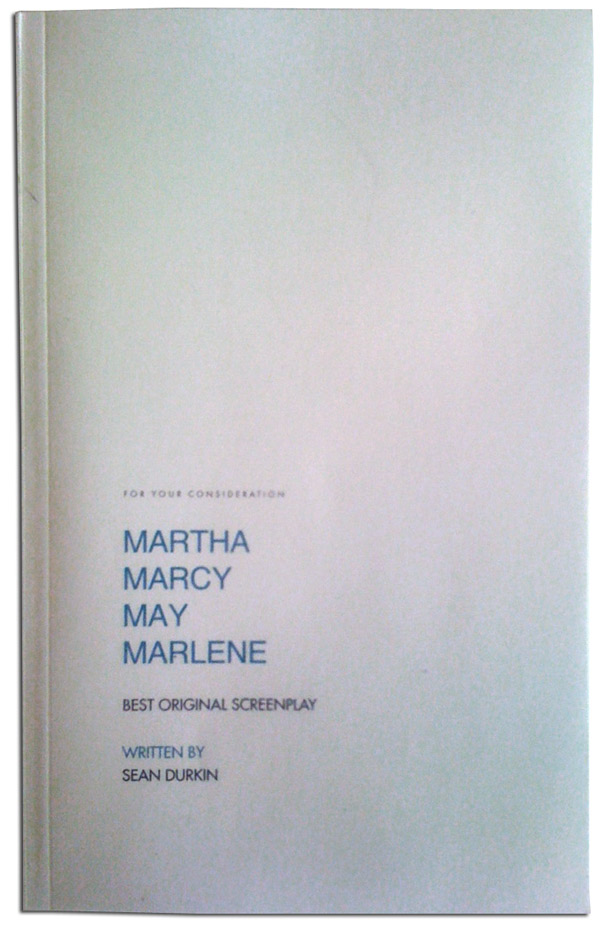 Oscar ballots hit the post office one week from today but movies often live well beyond the confines of awards season if they're any good.
Oscar ballots hit the post office one week from today but movies often live well beyond the confines of awards season if they're any good.
One film that I suspect will be vying for the great honor of Best Future Shelf Life, with or without Oscar nominations, is Sean Durkin's cult drama Martha Marcy May Marlene. Durkin was recently named one of Forbes "30 Under 30" and a week ago the prestigious Los Angeles Film Critics Association named the creative team the recipients of this year's "New Generations" award. It's one of the best critical calls this season; who wouldn't be eager to see what this team comes up with next?
I spoke to Durkin recently about his debut feature which hits BluRay and DVD on February 21st, 2012. That happens to be one week before the Oscars but let's not get hung up on dates since Martha herself never knows what time it is.
There are no clocks or calendars in those places. People totally lose track of time..."
 The FYC Original Screenplay shipped to votersSo Durkin tells me while discussing his research for the film and interviews he'd had with former cult members like the fictional Martha. "They don't remember anything about the first couple of weeks. But they get flashes and then they remember lying to everyone about where they've been. They're always paranoid." Piecing together the past when your identity has been systemically reprogrammed is difficult work. The decision to crosscut between the past and present, Martha never quite able to keep them separate, seemed like the only way to go. "It just made sense to me"
The FYC Original Screenplay shipped to votersSo Durkin tells me while discussing his research for the film and interviews he'd had with former cult members like the fictional Martha. "They don't remember anything about the first couple of weeks. But they get flashes and then they remember lying to everyone about where they've been. They're always paranoid." Piecing together the past when your identity has been systemically reprogrammed is difficult work. The decision to crosscut between the past and present, Martha never quite able to keep them separate, seemed like the only way to go. "It just made sense to me"
The challenging movie favors ambiguity in its storytelling. The writer/director laughs when asked which question he most hates getting during the ambiguous-averse tradition of Q&As. (He's been promoting the movie for nearly a year now, starting at Sundance, and I figure he's heard some doozies.)
That's an original question! Whatever people feel when they're watching it or if they walk out, it's all fine."
[Ambiguity, That Title and What's Next? after the jump]
Since Durkin is zen-like when it comes to the divisiveness of the film I offer to hate on a few typical questions for him, namely 'What happens at the end!?!' One of the film's richest moves is its open ended finale, which succeeds expertly in dropping you into the confusing paranoid headspace of Martha (Elizabeth Olsen), a place you keep fearing to go but wanting to reach as you stare at her throughout the film.
The riddle-like title, which feels like an incantation once you're hooked on the movie, is also purposefully mysterious and representative of Martha's own confusion. It came to Durkin quickly while dreaming up the project. "I saw these pictures of these girls and they all had aliases. They'd be like Janet aka Brenda and things like that," he explains. "I thought her name would be Martha -- Martha aka Marcy May aka Marlene -- even before I had written a draft that was in my head."
 Elizabeth Olsen might not recognize herself in "Martha Marcy May Marlene"
Elizabeth Olsen might not recognize herself in "Martha Marcy May Marlene"
Some people want more details, others are happy with the scarcity. The screenplay wasn't always so spare as Durkin tells it.
I always write more and cut it down. So that was definitely a tough battle the whole time with writing, directing, editing. It was always working on 'How much is just enough information? How much is not enough? Where do we find the balance? How do we convey information naturally?'
My focus always was that I'm interested in seeing a scene play out naturally how people would talk than forcing some conversation that explains what happened. There was never anything totally clear but you do drafts and drafts and drafts of scenes and figure it out. The script that the actors read and that we went into production with was also more full as well. The first thing i did with the actors is say "are any of these lines not working for you?". We'll read it through and right away I'll try to cut a few lines.
Some writers might object to the whittling but Durkin is also a director so his vision is intact. This fluidity in creation is also evident in his working relationships. One of the unusual aspects of Durkin's fledgling career and Martha itself is the filmmaking team it springs from. Durkin has been working with fellow filmmakers Antonio Campos and Josh Mond for years and they trade duties on their shorts and features. The cinematographer Jody Lee Lipes is frequently behind the camera. After School, Campos's directorial debut, like Martha, also stares intently at an unknowable central character for two hours and is equally short on force-feeding you information.
I wonder how closely their artistic sensibilities match up. Very closely according to Durkin when asked about the After School similarities. They discovered filmmakers and filmmaking together. They sit in the editing room together. They have similar interests.
 Antonio Campos, Sean Durkin and Josh Mond at this year's New York Film Festival
Antonio Campos, Sean Durkin and Josh Mond at this year's New York Film Festival
Beyond the organic influence of creative partners he's quick to cite Robert Altman as a favorite and 70s cinema in general which freed up his screenwriting.
When I was in school I took screenwriting classes and I just couldn't wrap my head around screenplay structure. It could be told to me over and over again and for some reason I couldn't understand it. I'd go and watch those films and so many of them --there's a few that stand out for me like Jerry Schatzberg's Scarecrow or Panic in Needle Park -- they're not so much about structure but about characters and journey. That was really liberating to see and I connected to that and the freedom of that."
With the success of Martha Marcy May Marlene behind them, but for the small matter of awards ceremonies, I wonder how this tight team of filmmakers will follow up their "New Generations" buzz? This interview doesn't end ambiguously, though it is short on specificity. "I've got a script in the works," is all that Durkin offers as we wrap.

Related: "Actressland" Martha Marcy... | Martha Marcy Review | Screenplay Charts
Recent Interviews: Judy Greer | Olivia Colman | David Cronenberg | Mike Mills | Ben Foster